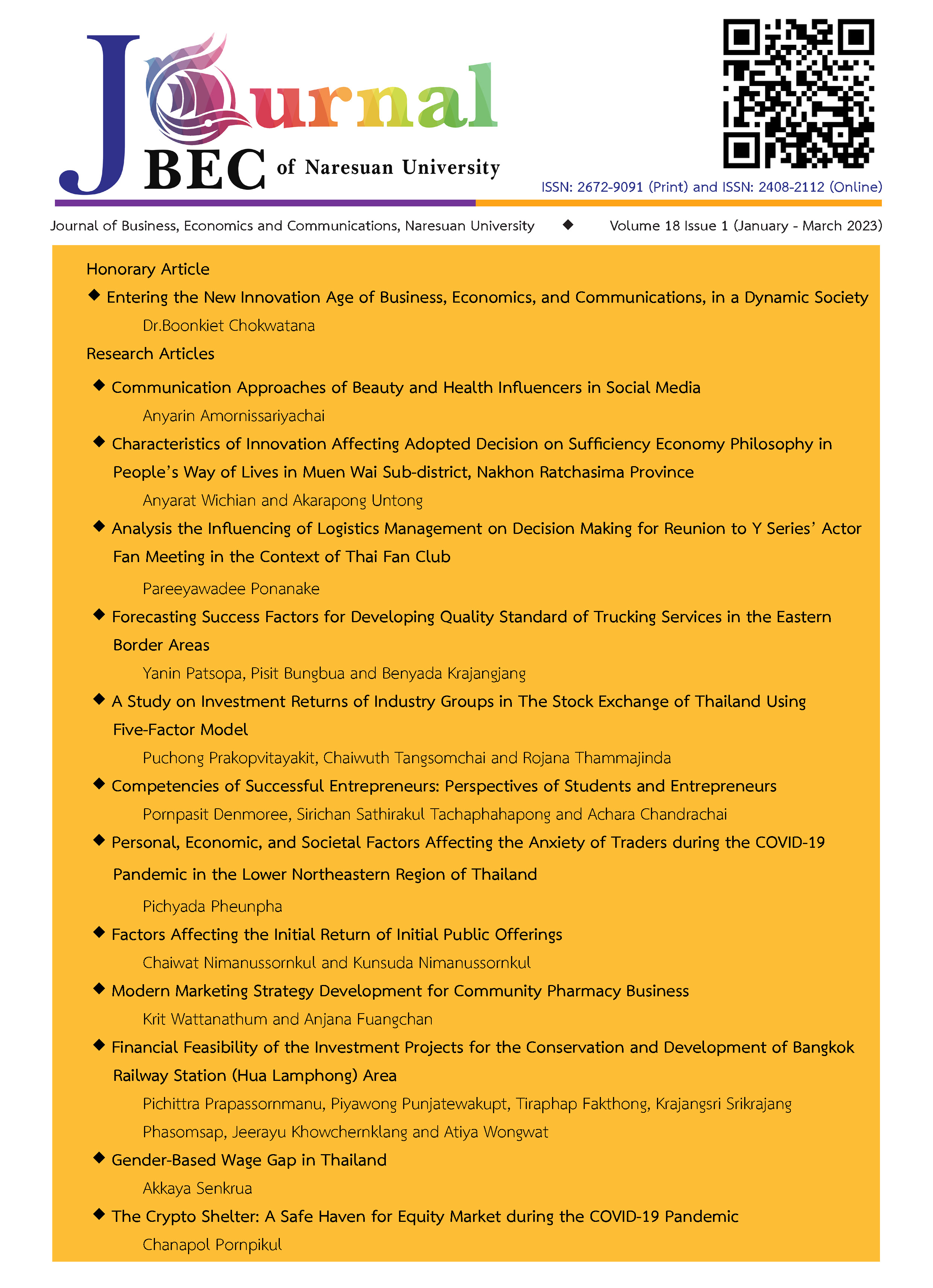Personal, Economic, and Societal Factors Affecting the Anxiety of Traders during the COVID-19 Pandemic in the Lower Northeastern Region of Thailand
Main Article Content
บทคัดย่อ
The objectives of this research were to 1) study the anxiety levels of traders during the first wave of the COVID-19 epidemic. 2) To study personal factors, socio-economic factors affect traders' anxiety during the COVID-19 epidemic. Samples were 157 sub-districts from 559 sub-districts by purposive sampling method in 4 provinces in the lower northeastern region, namely Ubon Ratchathani, Amnat Charoen, Sisaket, and Yasothon. The respondents in the sample were 3,561 people who traded in these 157 sub-districts in the four lower northern Isan provinces: survey research and a questionnaire with a reliability of 0.87 were used in this study. Data analyses were descriptive statistics and multiple linear regression. The research found that the traders' anxiety was at a moderate level. They were afraid of COVID-19, followed by they had no spare to spend on the COVID-19 situation. Next, the business could not proceed with the COVID-19 epidemic, and they could not adapt to the new normal at a high level. Other anxieties were at a low level. The MLR results showed that R = 0.398, the independent variables and traders' anxiety, were moderate-level. R2=.15.5 means the independent variables can variation the anxiety traders by 15.5 percent. The positive influencing variables are 1) awareness of the cost of COVID treatment. 2) Perception of community news information about opening-closing of business. 3) The perception of the governor's declaration communication to close-open business. 4) The loan business, 5) lower-income, and 6) health expenses. The influencing variables that decrease anxiety were: 1) electricity bill, 2) monthly income, 3) age, and 4) travel expenses, respectively.
Article Details

อนุญาตภายใต้เงื่อนไข Creative Commons Attribution-NonCommercial-NoDerivatives 4.0 International License.
เอกสารอ้างอิง
Anantanathorn, A. (2019). Stress and tension management of police officers in the provincial police region 2. Political Administration and Law Journal, 9(3), 137-171.
Borkovec, T. D., Ray, W. J. and Stöber, Joachim. (1998). Worry: A cognitive phenomenon intimately linked to affective, physiological, and interpersonal behavioral processes. Cognitive Therapy and Research, 22(6), 561-576.
Cronbach, L. J. (2013). Five perspectives on validity argument. In Test validity (pp. 3-17). Routledge.
Chotpittayasunon, T. (2020). Factors affecting perception anxiety about COVID -19 in the population of Bangkok metropolitan region. Retrieved April 16, 2020, from http://doh. hpc.go.th/bs/issueDisplay.php?id=462&category=B10&issue=CoronaVirus2019/
Department of Mental Health, Ministry of Public Health. (2008). Manual stress relief. Bangkok: Thammasat University.
Department of Mental Health, Ministry of Public Health. (2019). Worried about debt crushing mental health, suggesting five ways to create happiness - not tied to money. Retrieved April 16, 2020, from https://www.dmh.go.th/news-dmh/view.asp?id=29887/
Department of Mental Health, Ministry of Public Health (2020). Knowledge of physical health care mental health in the situation of the COVID-19 epidemic, "ready heart, not willing to get sick". Talard Khwan Subdistrict, Mueang District, Nonthaburi Province. Retrieved April 30, 2020, from https://dmh.go.th/covid19/pnews/files/
Ekpanyasakul, S. (2020). An effecting factors anxiety from the COVID –19 information of the population in Bangkok. Master thesis, M.B.A., Ramkhamhaeng University. Bangkok.
Euaariyapanichkul, P. (2006). Anxiety and factors associated with stress in job finding of the senior undergraduate students Chulalongkorn University Bangkok: Chulalongkorn University. Master Thesis, Mental Health, Chulalongkorn University, Bangkok.
Fong, M. W., Gao, H., Wong, J. Y., Xiao, J., Shiu, E. Y. C., Ryu, S. and Cowling, B. J. (2020). Nonpharmaceutical measures for pandemic influenza in nonhealthcare settings-social distancing measures. Emerging infectious diseases, 26(5), 976–984.
Ingard, A., Kanjanapoomi, N., and Sheoychitra, P. (2020). Undergraduate student’s anxiety during the coronavirus disease epidemic in 2019. MUT Journal of Business Administration, 17(2), 94-113.
John Hopkins University. (2020). New cases of COVID-19 in world countries. Retrieved April 14, 2020, from https://coronavirus.jhu.edu/data/new-cases/
Kanchanawasee, S., Pitayanon, T., and Srisuko, D. (2008). Selection of appropriate statistics for research (5th ed.). Bangkok: Chulalongkorn University Printing.
Jin, Y., Pang, A. and Cameron, G. T. (2007). Integrated crisis mapping: Toward a publics-based, emotion-driven conceptualization in crisis communication. Sphera Publica, 7, 81–95.
Pheunpha, P. (2017). Business statistics. Ubon Ratchathani: Ubon Ratchathani University Press.
Salkind, N. J. (2013). Tests & measurement for people who (think they) hate tests & measurement (2nd ed.). Los Angeles, CA: SAGE Publications, Inc.
Schiffmin, L. G. and Kanuk, L. L. (2007). Consumer behavior (9th ed.). Upper Saddle River, NJ: Pearson Education.
Suwanaphant, K., Seedaket, S., Vonok, L., Assana, S., Wawngam, W., Kingsawad, K., On-Kail, P. (2020). Factors associated with stress due to corona virus disease 2019 (COVID-19) pandemic among students of the faculty of public health and Allied Health Sciences, Praboromarajchanok Institute. Journal of Research in Health Sciences, 14(2), 138 -148.
TVSEP. (2018). Thailand household level survey guide. Thailand-Vietnam socioeconomics panel. Poverty Dynamics and Sustainable Development. Interview Guidelines for 2018 Household Survey. Retrieved November 19, 2019, from https://www.tvsep.de/fileadmin/tvsep/Questionnaires_all/2nd_Migrant_questionnaire/TVSEP_MigrantQuestion naire_2018_VN_TH.pdf/
Vichaiyut Hospital (2019). Tourism is good for good health. Retrieved April 20, 2020, from https://www.vichaiyut.com/th/health/informations/ Tourism is good for good health/
World Health Organization. (2020). Health topics/coronavirus. Retrieved April 16, 2020, from https://www.who.int/emergencies/diseases/novel-coronavirus2019/ situation-reports/
Worldometer Coronavirus. (2021). COVID-19 coronavirus pandemic. Retrieved April 16, 2020, from https://www.worldometers.info/coronavirus/


